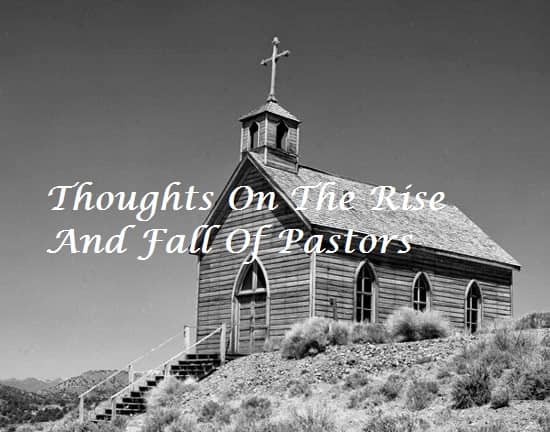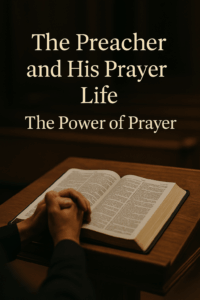⏱️ Estimated Reading Time: 13 min read
His fame spread far and wide, for he was greatly helped until he became powerful.
But after Uzziah became powerful, his pride led to his downfall. He was unfaithful to the Lord his God.
(2 Chronicles 26:15-16)
In the past year, five of my friends who are pastors have lost their ministries because of moral failure.
Five.
Most of them were widely known beyond their local contexts as authors, conference speakers, movement leaders and such. From the outside, they appeared to be at their peak.
For reasons beyond my ability to understand, God has graciously protected me from moral collapse over the years. Knowing the fragility and fickleness of my own heart, sometimes I marvel at how this could be the case. Why them and not me? Sometimes I wonder if, under different circumstances, I, too, could collapse morally. As the famous hymn goes, “Prone to wander, Lord, I feel it…” Indeed, I feel my proneness to wander every single day.
When I was a seminary student, an older, seasoned pastor spoke in a chapel service and said, “Some of you are very gifted. You aspire to do great things in ministry one day. God have mercy on you.” Eighteen years later, I am beginning to understand what he meant by that.
And do you seek great things for yourself? Seek them not.
(Jeremiah 45:5)
Charles Haddon Spurgeon, the great Baptist “Prince of Preachers,” once told his students that if they could be happy doing something besides ministry, they should do it. I’m sure there were several reasons why Spurgeon gave this advice. But the reason his advice makes sense to me is because…
Being a pastor is hard.
One day in my mid-twenties, while studying to become a pastor, I came across a suicide note published in the local newspaper…written by a pastor, which included this excerpt:
God forgive me for not being any stronger than I am. But when a minister becomes clinically depressed, there are very few places where he can turn to for help…it feels as if I’m sinking farther and farther into a downward spiral of depression. I feel like a drowning man, trying frantically to lift up my head to take just one more breath. But one way or another, I know I am going down.
The writer was a promising young pastor—still in his thirties—of a large “resource” church in Saint Louis, Missouri. Having secretly battled depression for a long time, and having sought help through Scripture reading, prayer, therapy, and medication, his will to claw through yet another day was gone. In his darkest hour, the young promising pastor decided he would rather join the angels than continue facing demons for years to come.
Some of those “demons,” it turned out, were high-powered members of his church, whose expectations of him were impossibly high. More on this in a moment. But first…
Not many months after this man’s tragic suicide, another pastor, also from Saint Louis, asphyxiated himself to death because a similar, secret depression.
As an aspiring pastor myself, the news of these two pastor suicides rocked my world. How could these men—both gifted pastors who believed in Jesus, preached grace, and comforted others with gospel hope—end up losing hope for themselves?
As the stories of these pastors became more public, it became clear that both of them shared an all-too common reality for pastors. Both had allowed themselves to become isolated…especially in their churches.
They had plenty of adoring fans.
But they had few, if any, actual friends.
In his suicide note, the first pastor said that he felt trapped. He was isolated and depressed, but he didn’t tell anyone because he thought that it would ruin his ministry. He had come to believe that pastors weren’t allowed to be weak. Nor were they allowed to be human, like everybody else.
Unfortunately, the two pastors from St. Louis are not rare. Many of us pastors, including Spurgeon and including me, have fallen into the emotional abyss—not in spite of the fact that we are in ministry, but because we are in ministry.
Studies show that pastors experience anxiety and depression at a rate that is disproportionately high compared to the rest of the population. Due to the unique pressures associated with spiritual warfare, unrealistic expectations from congregants and oneself, the freedom many feel to criticize and gossip about pastors with zero accountability (especially in the digital age), failure to take time off for rest and replenishment, marriage and family tensions due to the demands of ministry, financial strains and self-comparison, pastors are prime candidates for relational isolation, emotional turmoil, and moral collapse.
Studies also show that some pastors face unreasonable, even impossible, demands placed on them by their people. I am NOT one of those pastors, thanks to a church that both receives my gifts and embraces my limitations. All in all, the people of Christ Presbyterian Church treat me with extraordinary love and kindness. But, sadly, not all pastors are as lucky as I am.
Dr. Thom Rainer, a leading pastoral ministry guru, once conducted a survey asking church members what they expected from their pastors. Specifically, Dr. Rainer wanted to know the minimum amount of time church members believed their pastors should give each week to various areas of ministry, including prayer, sermon preparation, outreach and evangelism, counseling, administrative tasks, visiting the sick, community involvement, denominational engagement, church meetings, worship services, and so on. On average, the minimum amount of time church members expected their pastors to give to the ministry was 114 hours per week.
Ministry can also take a toll on the pastor’s family. When church members don’t like the pastor’s sermon, when they don’t like the direction of the church, when they think the music is too loud (or too soft), when they believe the pastor should wear a suit instead of jeans (or jeans instead of a suit), when the pastor moves someone’s cheese or messes with someone’s “sacred cow,” the pastor’s spouse can become a sounding board for disgruntled church members.
Second only to those who are married to public officials, no spouse in the world is thrust into the line of “friendly fire” more than the pastor’s spouse. For this very reason, it took my wife Patti forty-five minutes to say “yes” to my marriage proposal! The pastor’s spouse can also experience loneliness, because in some churches, the pastor is expected to be as available to the church as he is to his own family.
Then there are the PK’s—the “Pastor’s Kids”—those little ones in the church who are sometimes expected to behave like mature grown-ups. Consciously and subconsciously, the Pastor’s Kids don’t feel that they are allowed to be kids like their peers. They feel a unique pressure to please, to perform, to play the part, to put on a show, to be on their best behavior at all times. For some, this pressure leads to perfectionism and stress. For others, it leads them to rebel. It can be difficult for PK’s to blend into the crowd and develop their own identities and personalities—because unlike most kids, they live their lives in the public eye. Sharing a last name with the pastor fuels a lot of unspoken (and sometimes spoken) pressure for a six-year-old, or for a teenager, to navigate.
So why am I telling you all of this? For a few reasons…
First, if you are a pastor, or if you are the family member of a pastor, I want you to know that the pressure and isolation that you sometimes feel is normal. Yours is a unique calling from God—an unspeakable privilege, to be sure—but is sometimes also, as I have already mentioned above, unspeakably hard. The enemy is not fond of your life’s mission. He is threatened by it, so he is going to attack you. Sometimes he will attack and accuse you through the very people God has given you to shepherd and love. When this happens, please don’t get cynical about God’s people. Jesus didn’t, even from the cross. Stay hopeful about the church like Paul did with Corinth. Look at the cracked seed and envision the flower or the fruit tree. And? Even when you are unfairly criticized, look for a nugget or two of truth in the criticism, and you may find something in there to repent of…and every opportunity to repent is also an opportunity to draw near to Jesus afresh.
But, we pastors must also admit that there are times when we, and not congregants who struggle with our leadership, are the actual problem. When we feel under pressure, we can become sensitive, defensive, snippy, and even aggressive if we aren’t careful to guard our hearts. As pastors, we are vulnerable to paint ourselves as victims on the one hand, or to become bullies or crooks or adulterers on the other.
And so, if you are a pastor and criticism comes and the criticism actually is fair…when you have hurt people, compromised integrity, or even disqualified yourself from ministry…your task is of course to apply the things that you have taught others…to take full ownership of what you have done, to repent to God, and to make restitution to those who have suffered because of your decisions wherever possible.
But this isn’t all. Your task is also to do battle against the guilt and shame that will haunt you, the guilt and shame that will linger with you even after you have owned up to God and made restitution to and sought forgiveness from those who have suffered because of your actions. Even if the consequence of your actions ends up being the loss of your ministry, Jesus can still work with you. I dare say that he is eager to do so. If there was hope for Paul in his coveting (Romans 7), and hope for Peter in his racism and cowardice and denials of Jesus (Mark 16:7; Galatians 2), and hope for David after his adultery and murder (Psalm 51), then you can be sure that no matter how far you have fallen, you have not fallen beyond the reach of God’s grace and concern. Jesus came for sinners, not heroes. Perhaps the recognition that you are not a hero can be an occasion–maybe the first one in quite some time–to fall into his healing arms. Though his rod and staff of discipline may seem harsh for a time, may they become your source of comfort down the line…just as they did for David (Psalm 23).
And, pastors, lets pray for each other, shall we? Though the spirit is willing, our flesh is weak. Let’s never get past our need for Jesus to carry us, because without him we are vulnerable. We are vulnerable when our ministries are struggling, and—as the moral collapse of my five friends attests—we are vulnerable when our ministries seem to be soaring. Paul called this “living in plenty” and “living in want.” Regardless of our situation, we can do all things through Christ who gives us strength. Let’s believe this together, shall we? And let’s hold each other’s arms up when we struggle to believe.
Second, if you are not a pastor, it is time to once and for all remove your pastor from the pedestal where you and others may have been tempted to placed him. Under the right circumstances, we pastors can be some of the best friends and advocates. But we pastors make very, very bad heroes. Turning us into heroes not only hurts our churches, it also hurts us. When you put us on a pedestal and we fall, it hurts a lot more to fall from a pedestal than it does from the ground where everybody else is standing. Plus, only Jesus belongs on a pedestal. We pastors are shepherds…but we are also sheep just like everybody else. We have struggles and fears. We get depressed and anxious sometimes. We are at times unsure of ourselves, and we go through seasons wondering if we really belong in ministry. Many of us are more frustrated with ourselves than you could ever be with us. Sometimes we see our hypocrisy a lot more clearly than you do. Sometimes we grow more tired of ourselves than you grow tired of us. And sometimes we get on our high horse and need a faithful Nathan, just like David did, to help us see how we fail to live up to the things that we preach.
For these and other reasons, my daily prayer for myself is:
Father,
Always grant me character
that is greater than my gifts
and humility
that is greater than my influence.
Amen.
Will you also pray this for me? And…
If you are a congregant, please don’t stop holding us pastors to a high standard. Don’t let us off the hook from the high calling to lead with things like love, joy, peace, patience, kindness, goodness, faithfulness, gentleness and self-control. But as you do, please also leave some grace in your heart for us for those times when we will certainly need that from you. Because you see, all of us, including pastors, are incomplete works in process. We, like other Christians, are on a journey toward perfection. But we haven’t reached it yet. What Melville once said seems to fit:
Heaven have mercy on us all – Presbyterians and Pagans alike – for we are all somehow dreadfully cracked about the head, and sadly need mending.
The best grace you could give to us pastors, then, is this: Pray for us, live in community with us, and insist that we live in community with you. Please don’t put us on pedestals or treat us as heroes. Rather, recognize us as fellow sojourners with you. When this happens, I think that the chances of our becoming isolated and domineering and snippy and untruthful and full of ourselves and greedy and adulterous—and whatever else could eventually disqualify us—will be significantly reduced.
Thanks for listening to this grammatically messy dump of my feelings, which also represents the messiness of my heart as I cry over friends who have fallen…
…and as I wonder why it was them instead of me.
This post first appeared at Scott’s blog and is posted here with permission.




